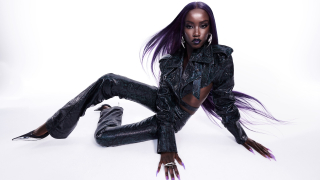R&B has changed drastically over the years, but if there’s one performer who’s remained consistent, it’s Monica Denise Brown. And so has her authenticity. A veteran in the music industry, she’s been gracing the radio waves with her soulful voice for nearly 25 years now. Having signed her first record contract as a 12-year-old, Miss Thang, now 35, has been around during the golden era of 1990s rhythm and blues and is still here to offer fans something that they can feel.
Sitting in a cleared out conference room at the Motor City Casino in Detroit—rocking a deep red mane and a full length electric blue and black Helen Yarmak fur complimented by a warm smile that flashes subtle diamonds and gold—Monica chats with EBONY. Her soft Southern accent accompanies her sweet and humble demeanor. A few feet away, patiently awaiting her to wrap up press, is her good friend Shanté Broadus: Snoop Dogg’s wife and Monica’s production team.
“I’m not one of those artists that gets frustrated,” Monica says. “I think it’s our job to continuously introduce them to what is relevant, music that has substance and still has a message, which pulls from the forefathers of music. If you listen to my first single [“Just Right for Me”], that’s a mixture of Smokey Robinson. That record wouldn’t exist without him. So when you tell that to this generation, it piques their interest. It makes them want to respect the music that we respect and love.”
Although Monica isn’t one to complain about the evolution of the music she’s championed for two decades, she still feels and acknowledges that R&B is not appreciated like it used to be. Hence tomorrow’s album, entitled Code Red, her eighth studio release. Executively produced by Polow da Don, Code Red features Monica’s longtime collaborator Missy Elliott, Lil Wayne, Timbaland, Akon and her 2-year-old daughter, Laiyah.
“Code Red is a real R&B soul album, but what I made sure that I did was mixed in a bit of the sounds that they’re accustomed to hearing now,” she says. “Without question, music has changed since the ’90s when we started originally working on my first record, Miss Thang. As things change, by no means am I trying to do what’s being done, but kind of bridge the gap between the two and introduce a whole different generation of kids to the music that I love and that I made throughout the ’90s.
“So it’s like a R&B soul fusion type of record,” Monica continues. “Timbaland and Missy. Polow is the executive producer. He helped me to get a lot of different new writers and merge different types of sounds together. It’s a great record for me as an artist, but it also had a very bold title, because I felt like R&B music is in a state of emergency in a sense that it’s not as respected as it used to be. And that’s something that I think we can bring back.”
Sometimes when a genre evolves, some veteran artists get frustrated and aren’t as supportive and accepting of newer artists. There’s even been a few R&B artists who have beefed like rap stars over their generation gap. But Monica is all about diversity.
“I’m a real big supporter of pretty much everybody. I feel like there is enough space for us all,” she says. “We live in a time and a day where people are constantly comparing everyone. If you like one artist and you like another one, you don’t go in the store and choose. You buy what you like. I always tell people to be supportive. I love Jazmine Sullivan. She even wrote ‘Everything to Me’ and a couple of other records for me. There’s so many artists I listen to.”
When Monica hit the scene in 1995 with her hit record, “Don’t Take It Personal (Just One of Dem Days),” she was just a sassy Southern girl letting folks know that she may have been young, but she was experienced. Now the married mother of three has great experience in balancing motherhood and her career.
“I always let everybody know before we work together, whether it’s companies, corporations, or producers, my family comes first,” she says. “And there’s no way to change the order in which I run it. I think a lot of people respect it, which I’m really fortunate and grateful for, because my children didn’t ask to be here. This isn’t the lifestyle that they chose. So what I do is, I make sure that they’re enjoying themselves and that they’re okay with what it is that I do.
“Pretty much most of [the Code Red Experience tour], they’ve been out and been able to watch the shows, enjoy them and be a part of them,” Monica continues. “My sons were always in the studio as I recorded, but now you have social media to document it. So you get to see my daughter there. But when I recorded my [first] albums, there was no Twitter or Instagram. We did what we did. I always made sure that my children were a part of it so that they never felt like they came second to what I did, because that’s not the case.”
Monica feels that her music changes as she grows personally. “It’s kind of like this evolution of me going from a girl to a woman to a mom to a wife to a mother of three. There’s a big difference from one and three. It’s just like the music constantly evolves because I am,” she says.
Although Mo (as the singer’s friends and team affectionately call her) is constantly striving, she stays connected to her fan base because of her validity and openness. “I think the way that I stay connected to the people is just being authentic, being real and genuine towards them,” she explains. “And singing about things that I’ve really experienced and being okay with being vulnerable and transparent. I think that’s what keeps us connected over the years.”
The connection Monica speaks of is apparent during her live shows. Her promotional tour, which ended in New York City on December 13, was a great experience for the singer. “What I notice is that in different cities, different songs, they gravitate more towards. One of the ones that pretty much goes over the same way every night is ‘Why I Love You Much.’ It’s funny, because when I recorded the record, I was about 14. So singing it now at 35 is totally different,” she gushes. “It’s just fun for me to see people still reacting to records that I know are very old, but they still have a significant meaning in their life.”
There have been many dreadful industry tales about a myriad of artists from the 1990s, from shady management to mishandling finances to being dropped from labels several times. Fortunately, Monica—who’s had the same recording contract for 20 years—has had a positive experience.
“Coming in at 12, I really just came in because I loved the music. I didn’t think too much about the political part of any it. It was good to have a mom and have family around that really cared. All they wanted was what was best for me. I don’t have any horror stories about the music business, with the exception that now everything is different,” she says.
“We don’t get the opportunity to put in the kind of work that we used to put in beforehand. They’re used to putting things out and working things through the Internet. We used to get on what we called the ‘chitlin circuit.’ You literally went to every single city and place that you possibly could until your album came out. But that’s not a complaint. It’s just a realization.”
Monica’s humility is what stood out the most during our chat and while watching the veteran singer meet and greet her fans prior to our interview. Her humility, undeniable talent and gratitude are perhaps the reasons she’s been around for two decades and counting.
“I’m just grateful for the fact that people still support and come out and show me this amount of love after 20 years,” she says finally. “It’s not something you can take lightly or for granted. That’s the first thing that comes to mind any time that I perform. I just take a moment to take it all in.”
Monica’s new album, Code Red will be available December 18.
Glennisha Morgan is a Detroit-bred multimedia journalist, writer, photographer, filmmaker, and educator. She writes about intersectionality, hip-hop and the women in it, pop culture, queer issues, race, feminism and her truth. Follow her on Twitter @GlennishaMorgan or at www.GlennishaMorgan.com.













